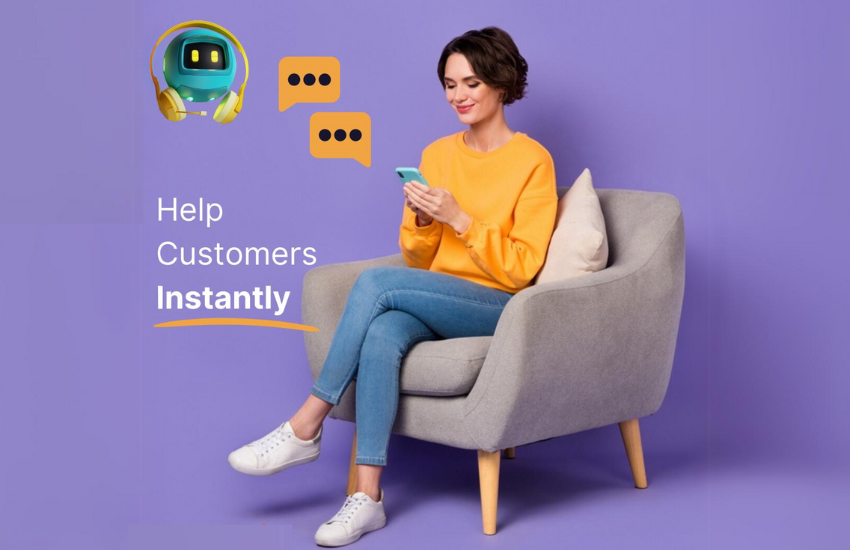



As businesses look to AI-powered solutions for customer engagement and efficiency, chatbots have emerged as essential tools. These versatile, AI-driven bots streamline customer service, marketing, and sales. Let’s explore the six primary types of chatbots that can transform business operations and engagement.
Rule-based chatbots, also known as decision-tree chatbots, operate by following preset rules defined by conditional logic. These bots excel at addressing common questions and simple, repetitive tasks but have limitations in handling complex queries. They’re ideal for businesses wanting a straightforward way to automate frequent customer inquiries without the need for AI complexity.
Retail, Travel, and Hospitality, Banking
Retail: Answer FAQs about product availability, store hours, and return policies.
Travel and Hospitality: Provide quick responses for inquiries like check-in times, amenities, and booking modifications.
Banking: Offer assistance on common questions about account types, interest rates, and branch locations.
AI chatbots, or machine learning chatbots, learn and improve over time through data analysis. These bots leverage natural language processing (NLP) to interpret and respond intelligently. Ideal for businesses requiring a more interactive and human-like customer support system, AI chatbots can handle nuanced customer inquiries, making them ideal for long-term customer engagement.
Healthcare, Financial Services, E-commerce
Healthcare:Offer personalized health tips, manage appointment booking, and guide users through symptom checkers.
Financial Services:Provide customized investment advice, answer complex banking inquiries, and guide clients through processes like loan applications.
E-commerce:Assist with product recommendations based on browsing history and handle complex customer service issues like refunds.
Combining rule-based functions and AI capabilities, hybrid chatbots are a versatile solution. They manage standard queries with preset rules and escalate complex issues to AI-powered processing. Many businesses choose hybrid chatbots for a balanced approach, enabling customer service automation with the assurance of a fallback for complicated interactions.
Telecommunications, Education, Real Estate
Telecommunications: Answer general questions and escalate complex inquiries about billing or technical support to live agents.
Education:Support prospective students with information on admissions, fees, and program details, and direct specific queries to advisors.
Real Estate:Provide basic property details, schedule viewings, and escalate complex financial or legal inquiries to specialists.
With the rise of voice assistants like Alexa and Siri, voice-activated chatbots are becoming essential for enhancing accessibility. These bots understand voice commands and offer seamless interactions, especially for businesses aiming to improve user experience for on-the-go customers. Voice-activated chatbots are popular in industries such as retail and hospitality, where hands-free, quick responses are a priority.
Retail, Automotive, Healthcare
Retail: Enable voice-based product searches, provide store directions, and support order placement.
Automotive: Assist customers with vehicle information, schedule maintenance appointments, and provide voice-based navigation for test drives.
Healthcare:Guide patients in scheduling appointments, provide medication reminders, and assist with answering basic health questions.
Social media chatbots interact with customers on platforms like Facebook Messenger, Instagram, and WhatsApp. They enable businesses to provide round-the-clock customer service, answer FAQs, and even process orders directly within social media channels. These bots are valuable for brands seeking to enhance their social media marketing and maintain active engagement with their followers.
Travel and Tourism, E-commerce, Food and Beverage
Travel and Tourism: Travel Chatbots share recommendations on travel destinations, answer inquiries about tour packages, and handle booking changes.
E-commerce:Respond to product inquiries, handle orders, track shipments, and manage returns directly within social media apps.
Food and Beverage:Take orders, provide menu recommendations, offer delivery tracking, and manage customer feedback.
Transactional chatbots assist customers with specific tasks, such as booking appointments, purchasing products, or making reservations. Equipped with payment gateway integration, these bots facilitate seamless sales automation, allowing customers to complete transactions without human intervention. They’re particularly effective for e-commerce and hospitality businesses that prioritize streamlined customer experiences.
E-commerce, Hospitality, Healthcare
E-commerce: Facilitate the buying process by answering product questions, handling payment, and sending order confirmations.
Hospitality: Allow guests to book rooms, request room service, and make payments without human intervention.
Healthcare: Healthcare Chatbots Enable patients to book appointments, process payments for telehealth services, and send reminders for upcoming appointments.
Iva
Online
Hi there 👋 I'm Iva. How can I help you today?